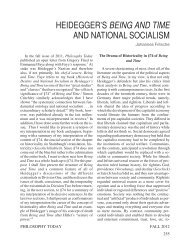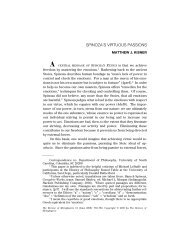The Essay as Self-Knowledge: Montaigne's Philosophical ...
The Essay as Self-Knowledge: Montaigne's Philosophical ...
The Essay as Self-Knowledge: Montaigne's Philosophical ...
Create successful ePaper yourself
Turn your PDF publications into a flip-book with our unique Google optimized e-Paper software.
64 ANN HARTLE<br />
the dialogue. A new art form that h<strong>as</strong> enduring meaning and that, in<br />
turn, begins to form thought, must itself be the necessary expression<br />
of thought that cannot be expressed in the available forms. As<br />
Jules Brody puts it: “Montaigne’s unsettling, unorthodox, cavalier,<br />
etc. way of writing is not a problem waiting to be solved, it is, rather,<br />
the solution to problems that he <strong>as</strong> a thinker and writer perceived and<br />
that, in publishing his Essais, he invited his eventual readers to confront<br />
with him and through him.” 2 So Montaigne invents the essay,<br />
not <strong>as</strong> a mere novelty, but <strong>as</strong> the perfect form of his philosophy. What,<br />
then, is this thought that cannot be contained within the customary<br />
forms? Why does Montaigne invent the essay?<br />
THE MEANING OF ‘ESSAY’<br />
We can begin to answer this by considering the meaning of<br />
Montaigne’s title, ‘<strong>Essay</strong>s,’ and some of the characterizations of the<br />
essay form that follow from the meaning of ‘essay.’ Erich Auerbach<br />
maintains that the meaning of the title “<strong>Essay</strong>s,” is rendered <strong>as</strong> “Tests<br />
upon One’s <strong>Self</strong>,” or “<strong>Self</strong>-Try-Outs.” <strong>The</strong> word ‘essay’ comes from<br />
‘essayer,’ which means to try or to attempt. Joseph Epstein notes that<br />
“in bringing up this etymology most people wish to understand the<br />
tentativeness of the form,” but <strong>as</strong> Epstein points out, “such modesty<br />
does not at all apply to Montaigne.” He prefers to take ‘essay’ in<br />
M. A. Screech’s sense of ‘<strong>as</strong>say’: the essays are <strong>as</strong>says “of himself<br />
by himself.” Marcel Conche’s interpretation emph<strong>as</strong>izes not the tentativeness<br />
but the boldness of the form: ‘s’essayer’ means “to try to<br />
think by oneself.” 3<br />
<strong>The</strong> characterization of the essay that seems to me to best describe<br />
it <strong>as</strong> a philosophical form is the one proposed by Michael<br />
Oakeshott. In his Preface to On Human Conduct, Oakeshott refers to<br />
the essay <strong>as</strong> the most appropriate expression of philosophical reflection<br />
understood in a certain way, i.e., <strong>as</strong> “the adventure of one who<br />
seeks to understand in other terms what he already understands and<br />
in which the understanding sought . . . is a disclosure of the conditions<br />
of the understanding enjoyed and not a substitute for it.” 4<br />
Oakeshott’s characterization captures the circular mode of<br />
Montaigne’s thought, a movement in which we begin with what is<br />
already understood and “<strong>as</strong>cend” to an understanding in other<br />
terms, an understanding that nevertheless actually returns to the first

















